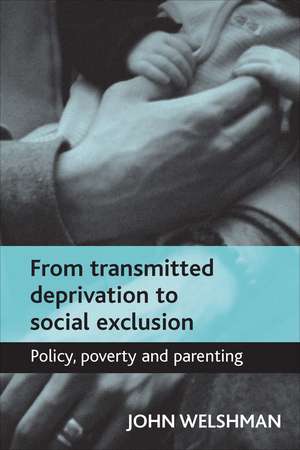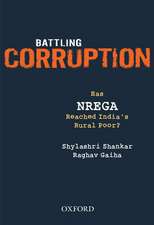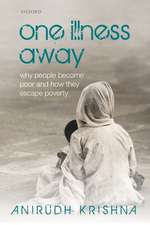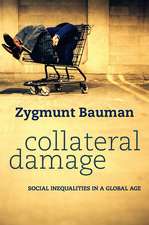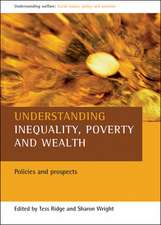From Transmitted Deprivation to Social Exclusion: Policy, Poverty, and Parenting
Autor John Welshmanen Limba Engleză Paperback – 12 iun 2012
Filling a major gap in social policy literature, this book looks at the history of debates over the poverty cycle and their relationship with current initiatives on social exclusion. The book uses Sir Keith Joseph’s famous “cycle of deprivation” speech in 1972 as a backdrop to explore British New Labour’s approach to child poverty: initiatives such as Sure Start, the influence of research on intergenerational continuities, and its new stance on social exclusion. Making extensive use of archival sources, private papers, contemporary published documents, and oral interviews with retired civil servants and social scientists, John Welshman provides the only booklength treatment of this important but neglected strand of social policy history.
Preț: 398.58 lei
Nou
Puncte Express: 598
Preț estimativ în valută:
76.27€ • 79.84$ • 63.11£
76.27€ • 79.84$ • 63.11£
Carte tipărită la comandă
Livrare economică 07-21 aprilie
Preluare comenzi: 021 569.72.76
Specificații
ISBN-13: 9781447305866
ISBN-10: 1447305868
Pagini: 280
Dimensiuni: 152 x 229 x 38 mm
Greutate: 0.52 kg
Editura: Bristol University Press
Colecția Policy Press
ISBN-10: 1447305868
Pagini: 280
Dimensiuni: 152 x 229 x 38 mm
Greutate: 0.52 kg
Editura: Bristol University Press
Colecția Policy Press
Notă biografică
John Welshman is a senior lecturer in public health at the Institute for Health Research at Lancaster University and the author of Underclass and Community Care in Perspective.
Cuprins
Acknowledgements
Abbreviations
Timeline: from transmitted deprivation to social exclusion
Introduction
Part One: The cycle hypothesis
1. Sir Keith Joseph and the cycle speech
2. From problem families to the cycle of deprivation
Part Two: The Transmitted Deprivation Research Programme
3. Conceptual difficulties: setting up the Research Programme
4. From a cycle of deprivation to cycles of disadvantage
5. The final years of the Research Programme
6. Poverty, structure, and behaviour: three social scientists
Part Three: New Labour and the cycle of deprivation
7. The broader context: social exclusion, poverty dynamics, and the revival of agency
8. From transmitted deprivation to social exclusion
Conclusion
References
Index
Abbreviations
Timeline: from transmitted deprivation to social exclusion
Introduction
Part One: The cycle hypothesis
1. Sir Keith Joseph and the cycle speech
2. From problem families to the cycle of deprivation
Part Two: The Transmitted Deprivation Research Programme
3. Conceptual difficulties: setting up the Research Programme
4. From a cycle of deprivation to cycles of disadvantage
5. The final years of the Research Programme
6. Poverty, structure, and behaviour: three social scientists
Part Three: New Labour and the cycle of deprivation
7. The broader context: social exclusion, poverty dynamics, and the revival of agency
8. From transmitted deprivation to social exclusion
Conclusion
References
Index
Recenzii
“Welshman’s book is a fascinating account of a hitherto largely neglected topic, and the author is to be commended for the breadth of his investigation and the relevance of the lessons he draws from it from today.”
"John Welshman's book is a thorough and fascinating study of the history of poverty and policy from the mid-twentieth century to the early twenty-first [and] contains a wealth of empirical detail. . . . This book is enormously valuable to a range of potential readers."
"John Welshman's focus is on the origins of Keith Joseph’s analysis in the 1970s, the direction of the government-funded research program that followed it and on the connections between ideas in the 1970s and New Labour’s approach to tackling poverty, social exclusion and anti-social behavior. He takes the perspective of a social historian, relying primarily on published documents, extensive archival research and interviews. He provides an in-depth case study of the political process from a variety of perspectives."
"This is an absorbing book. Using archive material well, it throws light on the relationship between social research, its funding, and its use by politicians. It also shows the continuity of ideas in social policy—though new terms like social exclusion may come into vogue, the thread of ideas over time remains."
